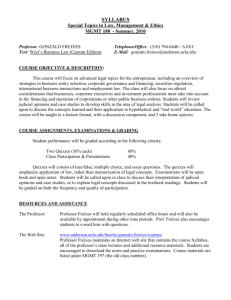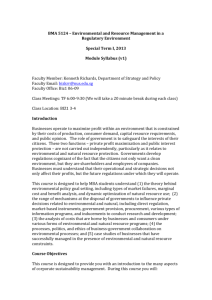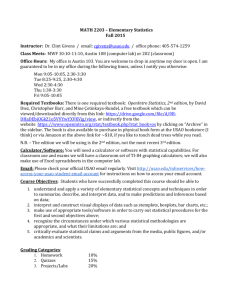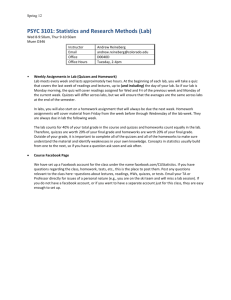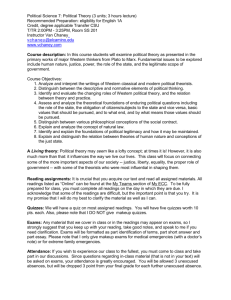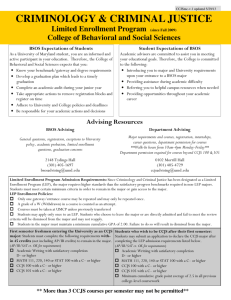Syllabus - Criminology and Criminal Justice Website
advertisement
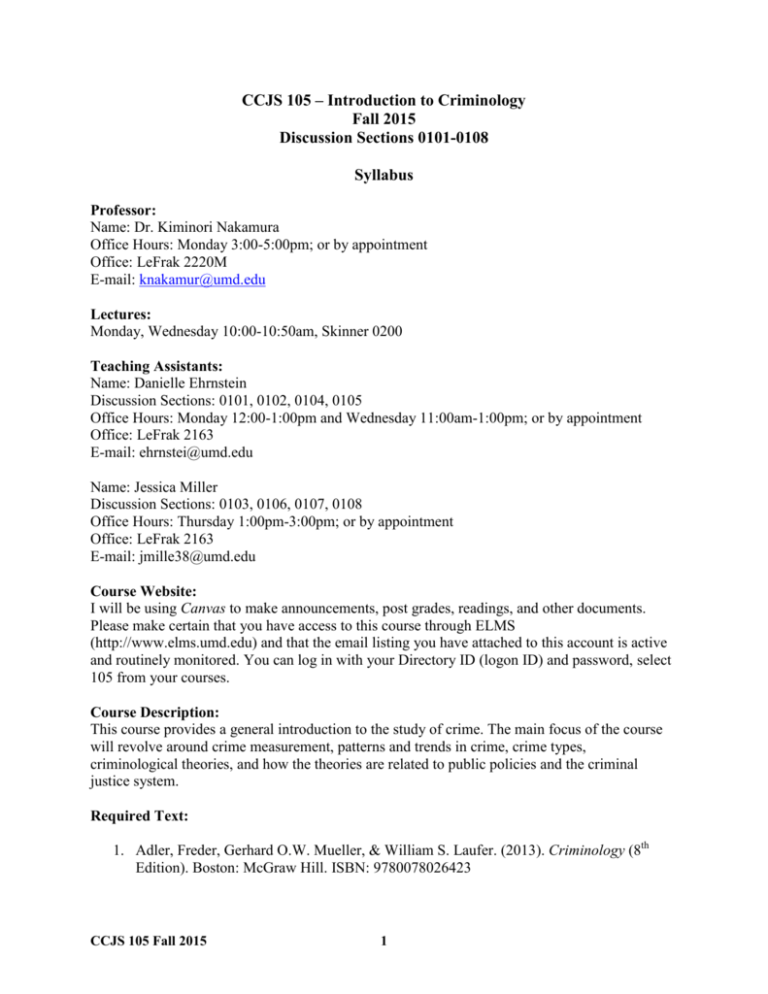
CCJS 105 – Introduction to Criminology Fall 2015 Discussion Sections 0101-0108 Syllabus Professor: Name: Dr. Kiminori Nakamura Office Hours: Monday 3:00-5:00pm; or by appointment Office: LeFrak 2220M E-mail: knakamur@umd.edu Lectures: Monday, Wednesday 10:00-10:50am, Skinner 0200 Teaching Assistants: Name: Danielle Ehrnstein Discussion Sections: 0101, 0102, 0104, 0105 Office Hours: Monday 12:00-1:00pm and Wednesday 11:00am-1:00pm; or by appointment Office: LeFrak 2163 E-mail: ehrnstei@umd.edu Name: Jessica Miller Discussion Sections: 0103, 0106, 0107, 0108 Office Hours: Thursday 1:00pm-3:00pm; or by appointment Office: LeFrak 2163 E-mail: jmille38@umd.edu Course Website: I will be using Canvas to make announcements, post grades, readings, and other documents. Please make certain that you have access to this course through ELMS (http://www.elms.umd.edu) and that the email listing you have attached to this account is active and routinely monitored. You can log in with your Directory ID (logon ID) and password, select 105 from your courses. Course Description: This course provides a general introduction to the study of crime. The main focus of the course will revolve around crime measurement, patterns and trends in crime, crime types, criminological theories, and how the theories are related to public policies and the criminal justice system. Required Text: 1. Adler, Freder, Gerhard O.W. Mueller, & William S. Laufer. (2013). Criminology (8th Edition). Boston: McGraw Hill. ISBN: 9780078026423 CCJS 105 Fall 2015 1 2. Canada, Geoffrey. (2010). Fist Stick Knife Gun: A Personal History of Violence (Revised Edition). Boston, MA: Beacon Press. ISBN: 9780807044612 Additional required readings will be available on the ELMS course website. Grading: Midterm Exam 1 (Non-cumulative): 100 points Midterm Exam 2 (Non-cumulative): 100 points Final Exam (Cumulative): 200 points Quizzes: 20 points Paper: 50 points Participation: 30 points _________________________________________ TOTAL 500 points Extra credit: 20 points maximum (added to your total points) Exams: Each exam will test you on material covered during the previous portion of the course. You will be held responsible for all assigned readings, lecture materials, class discussions as well as discussion section activities. The exams will consist of multiple choice and true/false questions. On exam days, you should arrive to class with a #2 pencil with an eraser and your UM student identification card. The two midterm exams will not be cumulative. The final exam will be cumulative. Quizzes: There will be three quizzes during the semester. The quizzes will be administered during discussion sections and will consist of multiple choice, true/false, and short answer questions. As with the exams, material on the quizzes may come from readings, lectures, class discussions, and discussion section activities. The quiz will be given during the first 15 minutes of the specified discussion; if you are late you will only be given the remaining time of this 15minute block to complete the quiz. So, please make sure you are on time. Only the two highest quiz scores will count toward the final grade. The additional points earned on the lowest quiz will serve as extra credit. Paper: For this writing assignment, each student will first select one of the theories discussed in class. The student will then obtain two peer-reviewed, empirical articles from criminology/criminal justice journals that test the theory you have selected. Using the two articles, the student will discuss the robustness and accuracy of the theory. The paper must be 4-5 pages in length. Detailed directions for the paper will be provided later in the semester in your discussion sections. Your paper is due in your discussion section during Week 14. Class Participation: This is a very large class, but I encourage participation during lectures. I expect you to attend every discussion section and participate frequently during these sessions. Attendance is not the same as participation. Active participation in the discussion sections is necessary for you to earn full participation points. CCJS 105 Fall 2015 2 Extra Credit: In addition to the lowest of the three quizzes (10 points maximum), you can earn an additional 10 points by coming to my office hours or your TA’s with questions at least once to discuss your progress in class and any issues or concerns you may have. The office hour visit must be completed prior to Week 13 to earn extra credit. To calculate final grades, add together the number of points acquired throughout the course (including the extra credit points), divide by 500 and multiply by 100. You receive the grade with the corresponding percentage. I round the percentage to the nearest number, rounding up at .5 (e.g., 86.4% will be B, 86.5% will be B+). I do not curve nor negotiate student grades at the end of the semester. It is recommended that you monitor your own progress. Percentage points will be converted to a letter grade as listed below: A+ (97% +) B+ (87-89%) C+ (77-79%) D+ (67-69%) A (93-96%) B (83-86%) C (73-76%) D (63-66%) A- (90-92%) B- (80-82%) C- (70-72%) D- (60-62%) F (<60%) Course Policies: Class Attendance: You are expected to attend every class. Since the exams and the quiz will cover reading and in-class discussions, missing multiple classes will likely result in a reduced final grade. If you do miss class, you should get the notes from a classmate. The TA’s and I will NOT share our notes. Classroom Behavior: You are required to be courteous to each other, to the TAs, and me. Any student who engages in disruptive behavior will be asked to leave the classroom. Being disruptive includes repeatedly coming late to class or leaving the classroom without authorization, making loud or distracting noises, sleeping, speaking without being called on, reading outside material, using a laptop for purposes other than note-taking, and talking on cell phones or text-messaging. At the same time, students should feel that they are being respected. If fellow students are not acting in a respectful manner, please inform me. Reading: You are expected to complete all reading assignments on time. The relevant reading materials can be found either in the required textbooks or on the course website. Discussion Sections: You have registered for a particular discussion section and this is the one that you are expected to attend. “Switching” discussion sections is only allowed when you have an excused absence with prior notification and proper documentation submitted to your TA and you have determined with your TA which discussion section can be your “make-up” for that single absence. If you are not able to switch within the same week, you will not make up the full participation points for that week even with proper documentation. If you arrive unannounced at a discussion section for which you have not registered for, you will be asked to leave. Missed Exams/Quizzes/Paper: No late work is accepted. Make-up exams and quizzes will be offered only under the following circumstances: a medical problem (self or dependent), a death in the immediate family, a religious holiday, or participation in University activities at the CCJS 105 Fall 2015 3 request of university authorities, and other compelling circumstances beyond the students’ control. Proper written documentation must be submitted for the make-up exams and quizzes. Such documentation includes an obituary/death notice, an official health center excused absence form, or hospital records. If you know in advance that you will be absent on the day of an exam, a quiz, or on the due date of the paper with an approved absence, you will be expected to take the exam, the quiz, or submit the paper prior to the exam/quiz date or the due date of the paper. Failure to abide by these rules will result in a grade of zero on the paper/exam/quiz. You will not be allowed to turn in missed assignments or make-up exams/quizzes if you have not notified me and provided proper documentation within one week of the date of the exam or the paper due date. Addendum on Medical Absences: The exams, the quizzes, and the paper are considered to be Major Scheduled Grading Events, and therefore the university medical excuse policy (http://www.president.umd.edu/policies/docs/V-100G.pdf), which allows one student-signed honor statement attesting to illness, does NOT apply. The signed honor statement, however, can be applied to the discussion sections but only in the event you have provided written notice, either hard copy or email, to your TA prior to the discussion section meeting that you are going to miss. In the event you become chronically absent, missing more than two consecutive weeks of class, due to the same persistent illness this must be verified by a health professional in writing and be brought to my attention in writing. Any absences from Major Scheduled Grading Events will be counted as zeroes in the event you have failed to inform me of these developments within one week of the grades for the remainder of the class being posted on Canvas. Please refer to the link above in locating the items that must be included in both the signed honor statement and chronic absence verification. Grade Disputes: If you have questions or concerns about your grade(s) and believe the TA’s and/or I should review them, you must submit a written request over email to your TA that describes your concern in detail. This request must be submitted within one week of the day that grades for the relevant assignment are disseminated. Academic Integrity: Academic dishonesty will not be tolerated and any violations will be reported to the Honor Council. Academic dishonesty includes cheating, fabrication of information used in assignments, plagiarism, and knowingly facilitating the academic dishonesty of another. For more information on the Code of Academic Integrity or the Honor Council, please visit the following website: http://shc.umd.edu/SHC/Default.aspx. Religious Observance: If you have a request for a make-up exam, quiz, or paper listed on the syllabus due to religious observance reasons, you must submit this request to me in writing (hard copy) with the specific details by September 14. Students with Disabilities: I will be willing to make necessary accommodations for students who are registered with the Disability Support Service (DSS) Office and who provide me with a University of Maryland DSS Accommodation letter. This letter must be presented to me by September 14. I am not able to accommodate students who are not registered with DSS or who do not provide me with documentation that has been reviewed by DSS after September 14. DSS CCJS 105 Fall 2015 4 students who are requesting to take their exams at the DSS Center need to provide me with a Test Authorization Form for each exam that must be turned in to me no later than one week prior to each exam. The student is expected to take the exam at the same time as the rest of the class. Athletes: Official athletic schedules must be submitted to me by September 14. It is the student’s responsibility to inform the TA of upcoming discussion section absences. Practices do not count as an excused absence; in cases of an excused absence (e.g., a game), students are expected to determine with their TA which other discussion section they can attend as a “makeup.” Athletes who miss any exams/the quizzes/the paper/discussion sections due to games or other commitments, yet never submitted an official athletic schedule by September 14, and never spoke with me and/or your TA, will receive a grade of zero for the relevant assignment. Inclement Weather Policy: On occasion, classes may be cancelled due to inclement weather. If the university is closed on the day a graded item is scheduled the graded assignment will be rescheduled for the next class meeting in which the university is open. If a final exam is cancelled, we will follow university rules for rescheduling. Copyright: The lectures that I deliver in this class and the course materials I create and distribute are protected by federal copyright law as my original works. My lectures are recorded or delivered from written lectures in order to ensure copyright protection. You are permitted to take notes of lectures and to use course materials for your use in this course. You may not record my lectures or reproduce or distribute notes of lectures or my course materials or make any commercial use of them without my express consent. Communication: The preferred means of communication is via email or in person during your TA’s or my office hours. You are responsible for checking your UMD email and any announcements on Canvas. Due to the volume of emails that both I and the TA’s receive, please include in the subject line “CCJS 105” and your discussion section number whenever you send an email, which will increase the probability of your email not being considered as junk mail. Also, be sure to sign your message by just typing your full name at the end of your email, so we know who you are. Course Evaluations: Your feedback about this course is very important to me and your TAs and is a responsibility you hold as a student member of our academic community. There will be a mid-semester evaluation in the form of anonymous questionnaire in your discussion section, which will be used to help improve your learning experience. You will also have an opportunity to provide feedback about this course at the end of the semester (www.courseevalum.umd.edu). Course schedule (*Subject to Change): Week 1 (August 31, September 2: No discussion section this week) - Introduction to Course and Criminology - The Meaning of Crime Readings: Adler et al. Chapter 1 ************************************************************************** CCJS 105 Fall 2015 5 Week 2 (September 9: No class on September 7 for Labor Day; No discussion section this week) - Measuring and Researching Crime Readings: Adler et al. Chapter 2 ************************************************************************** Week 3 (September 14, 16: Deadline for notification of special accommodations – DSS, religious observance, and athletic schedules – is September 14) - Measuring and Researching Crime - The Correlates of Crime Readings: Adler et al. Chapter 2 ************************************************************************** Week 4 (September 21, 23: Quiz in discussion) - Early Theoretical Developments: The Classical and Positivist School Readings: Adler et al. Chapter 3 ************************************************************************** Week 5 (September 28, 30) - Modern Biological and Psychological Explanations Readings: Adler et al. Chapter 4 ************************************************************************** First Midterm Exam: Monday, October 5, 10:00-10:50am in Skinner 0200 Remember to bring a #2 pencil with an eraser and your student ID Week 6 (October 7) - Introducing Sociological Explanations Readings: Adler et al. Chapter 5 (pages 109-124) ************************************************************************** Week 7 (October 12, 14) - Strain Theory - Social Disorganization Theory Readings: Adler et al. Chapter 5 (125-130); Article on ELMS; Canada, Part I (Codes of Conduct) ************************************************************************** Week 8 (October 19, 21; Quiz in discussion) - Learning Crime - Subcultural Theories Readings: Adler et al. Chapter 5 (pages 130-135); Adler et al. Chapter 6; Canada, Part II (A Matter of Time) ************************************************************************** Week 9 (October 26, 28) CCJS 105 Fall 2015 6 - Control Theories Readings: Adler et al. Chapter 7; Canada, Part III (The Best Way We Know How) ************************************************************************** Week 10 (November 2, 4) - Applications of Classical Theory - Deterrence Readings: Adler et al. Chapter 9; Article on ELMS ************************************************************************** Second Midterm Exam, Monday, November 9, 10:00-10:50am in Skinner 0200 Remember to bring a #2 pencil with an eraser and your student ID Week 11 (November 11) - Labeling Theory Readings: Adler et al. Chapter 8 ************************************************************************** Week 12 (November 16; No class on November 18; Quiz in discussion) - Critical Criminology Readings: Adler et al. Chapter 8 ************************************************************************** Week 13 (November 23; No Class on November 25; No discussion section this week) - Movie: “The Interrupters” Readings: None ************************************************************************** Week 14 (November 30, December 2; Paper due in your discussion section) - Continuing “The Interrupters” - Violent Crime, Terrorism, and Theory Readings: Adler et al. Chapter 10; Article on ELMS ************************************************************************** Week 15 (December 7, 9) - Developmental and Integrated Theories - Prisoner Reentry and Theory - Review & Catch-up Readings: Article on ELMS Final Exam will be scheduled by the University during the finals week CCJS 105 Fall 2015 7 Discussion Sections: * 0101 M......... 9:00am- 9:50pm (LEF 1201) Ehrnstein * 0102 M.........11:00am-11:50am (LEF 1220) Ehrnstein * 0103 M........ 12:00pm- 12:50pm (SQH 1107) Miller * 0104 M........ 1:00pm- 1:50pm (SQH 1107) Ehrnstein * 0105 W........ 9:00am- 9:50am (LEF 1201) Ehrnstein * 0106 W......... 11:00am- 11:50am (LEF 1220) Miller * 0107 W.........12:00pm-12:50pm (SQH 1107) Miller * 0108 W........1:00pm-1:50pm (LEF 1201) Miller CCJS 105 Fall 2015 8

